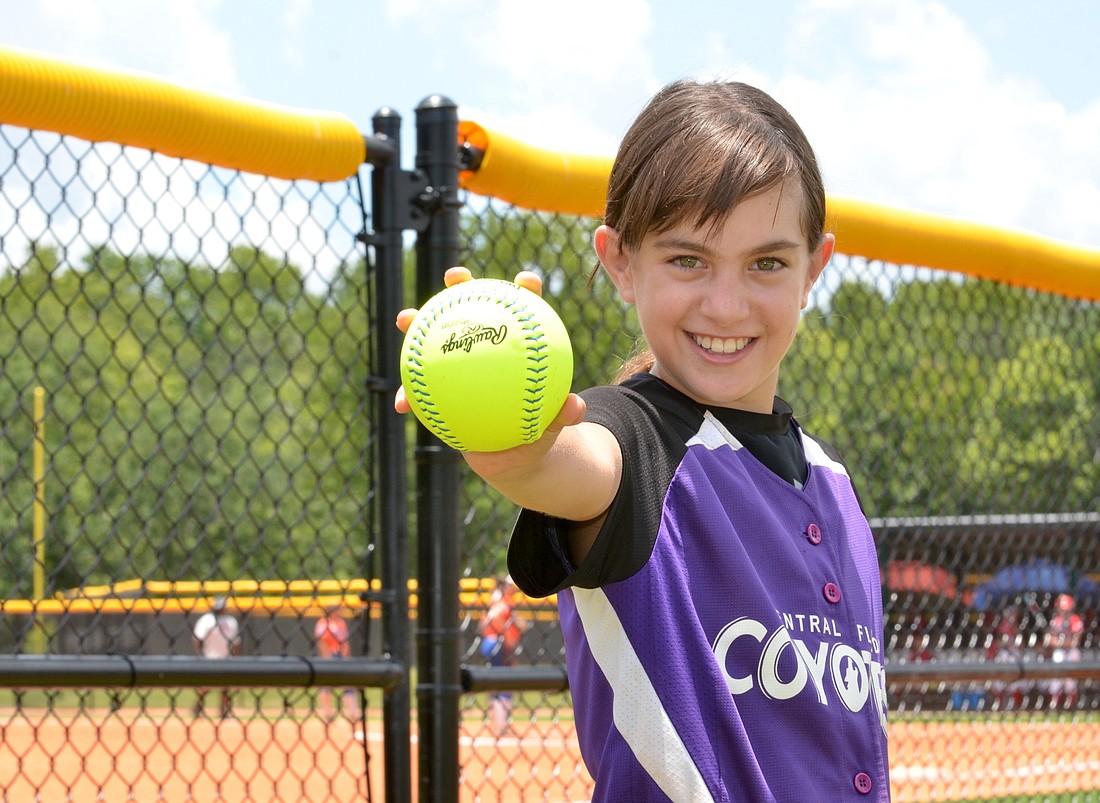- February 20, 2025
-
-
Loading

Loading

Lying in a hospital bed last November after having had surgery to remove a rare childhood brain tumor, Julia Benamati’s mind could have been any of many places.
Between the visits from family and friends, though, her thoughts would inevitably drift back to one central question.
Julia, 11, wanted to get back out on the softball diamond.
“Everyday it was, ‘When can I go back to softball? When can I do something that’s going to terrify my parents?’” said Christina Benamati, Julia’s mother.
Julia had been feeling ill for weeks leading up to her surgery. Greg and Christina Benamati, of Dr. Phillips, took their daughter to different doctors, ruling out one possibility after another in the process, until finally they arrived at a neurologist in early November. On Nov. 2, Julia underwent an MRI, and that’s when the doctors found the source of the problem — a golf-ball sized tumor on the back of Julia’s head, on her cerebellum.
Julia was admitted to the Arnold Palmer Hospital for Children that night.
“There was just complete disbelief that this was happening,” Greg said.
That night, the Benamatis watched Game Seven of the World Series together in Julia’s hospital room — Julia rooted for the Cubs. Two days later, on Nov. 4, she went under the knife.
Doctors believed Julia had juvenile pilocytic astrocytoma, a rare childhood brain tumor that — in most cases — is benign. After the surgery, which went off without a hitch, it would be a few days before doctors could conclude it was benign. While Greg and Christina worried, Julia daydreamed of being back out on the field, playing second base — or maybe catcher. And then there was her skateboard, which had been collecting dust since she had been admitted to the hospital.
The steady stream of visitors that frequented Julia’s room included teachers from school, teammates from the Central Florida Coyotes — her travel softball team — and her coach, Jes Willis.
Three days passed before the good news came: The tumor was benign and had not spread. Although doctors said Julia would need to return for MRIs every three to six months until adulthood, she was cleared to begin her recovery — something she took to with a vengeance.
“She clearly did not want to be there (in the hospital),” Christina said. “(Julia) did what they asked her to do … and they let her go two days early.”
Returning home did not mean an immediate return to the diamond. Because of the tumor’s location, Julia’s coordination and balance had been affected — doctors marveled that she had been able to run bases in the weeks before she was admitted. So, she began a physical therapy regimen. Physical therapy wasn’t all bad — Julia took a liking to the parts that involved playing on the monkey bars — but it was still something the local youngster was determined to power through. There was a concern by the doctors regarding whether she would fully and wholly recover her athletic abilities, but that wasn’t going to discourage Julia.
“The therapist was really surprised (at her progress),” Greg said. “Since the first visit, she saw that she was coming back really fast.”
While she was rehabbing, Julia didn’t stay far away from the field. Her coach trained her to keep the scorebook during games, allowing her to be present in some capacity.
“You had to pay attention and watch every play,” Julia said. “I was glad to be around the team.”
Finally, in March, Julia was cleared to return to the Coyotes.
For her parents, it was an occasion that was equal parts exciting, prideful and terrifying. For Julia, there was the minor inconvenience of being rusty with the basics.
Things came back to her, though, and at a weekend tournament early in May, she hit two triples on the same day — proof that she really was on her way back. Now, as she continues to progress, she’s excited to get back to work preparing for the Coyotes’ fall season.
She’s on the road to recovery, and softball gets at least some of the credit.
“There was no question that was a motivating factor,” Greg said.